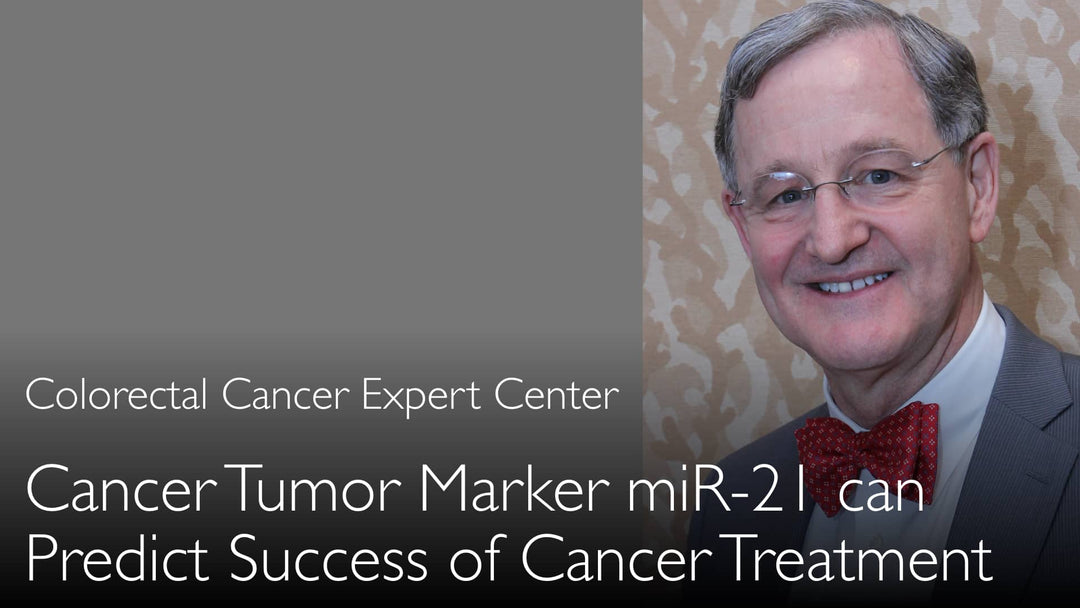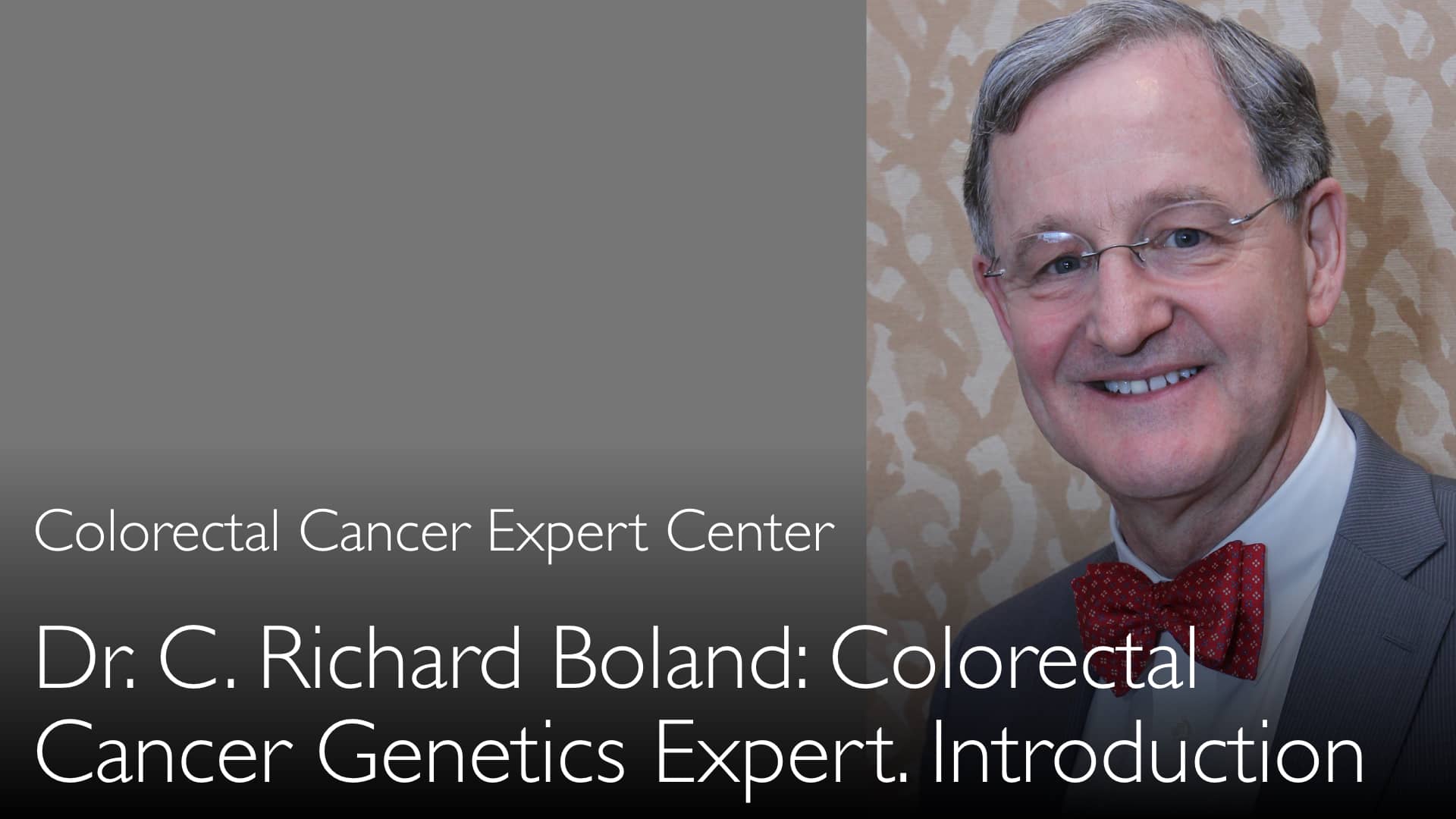Dr. C. Richard Boland, MD, en førende ekspert inden for kolorektal cancer genetik og molekylær diagnostik, forklarer, hvordan miR-21-mikroRNA-tumormarkøren revolutionerer screening og prognose for tyktarmskræft. Denne blodbaserede biomarkør hjælper med at identificere højrisikopatienter, som har behov for koloskopi, samtidig med at invasive procedurer sikkert kan udsættes for dem med lave miR-21-niveauer – hvilket potentielt kan transformere tidlige opsporingsstrategier.
miR-21-microRNA: Et gennembrud i blodprøver til screening og prognose for tyktarmskræft
Spring til afsnit
- Hvad er miR-21-microRNA-tumormarkør?
- Fordele ved blodprøve i forhold til traditionel screening for tyktarmskræft
- Prognostisk værdi i overvågning af tyktarmskræftbehandling
- Nuværende tekniske udfordringer i microRNA-testning
- Fremtiden for ikke-invasiv kræftscreening
- Vigtige fordele for patienter, der undgår unødvendige koloskopier
- Fuld transskription
Hvad er miR-21-microRNA-tumormarkør?
Dr. C. Richard Boland, MD, beskriver miR-21 som et af omkring 2.000 microRNA-molekyler i det menneskelige genom, der regulerer genexpression. I modsætning til traditionelle biomarkører identificeres microRNA-molekyler med numre i stedet for navne, og miR-21 viser sig konsekvent at være overeksprimeret i vævsprøver fra tyktarmskræft. Ved hjælp af RNA-sekventeringsteknikker kan forskere præcist kvantificere microRNA-niveauer i både tumorvæv og blodprøver.
Gennembrudsopdagelsen viser, at kræftceller indkapsler miR-21 i eksosomer, der frigives i blodbanen og skaber et målbart signal. Dr. Bolands forskning viser, at miR-21-niveauer falder efter fjernelse af tumoren, hvilket bekræfter dens rolle som en dynamisk indikator for kræfttilstedeværelse og behandlingsrespons.
Fordele ved blodprøve i forhold til traditionel screening for tyktarmskræft
Muligheden for, at en simpel blodprøve kan erstatte eller supplere koloskopi, repræsenterer et paradigmeskifte i opdagelse af tyktarmskræft. Dr. C. Richard Boland, MD, understreger, at forhøjede miR-21-niveauer kan identificere patienter, der kræver øjeblikkelig koloskopi, mens normale niveauer sikkert kan udsætte invasive procedurer med 1-2 år. Denne tilgang adresserer kritiske begrænsninger ved nuværende screeningsmetoder ved at tilbyde:
- Fjernelse af ubehag ved tarmforberedelse
- Reduceret risiko for procedurekomplikationer
- Lavere sundhedsomkostninger
- Forbedret patientefterlevelse af screening
Prognostisk værdi i overvågning af tyktarmskræftbehandling
Ud over screening viser miR-21 potentiale som et prognostisk værktøj til evaluering af behandlingseffekt. Dr. Bolands forskning viser, at microRNA-niveauer korrelerer med tumormængde og falder efter vellykket kirurgisk fjernelse. Denne realtidsovervågningsmulighed kunne hjælpe klinikere med at:
- Vurdere kirurgisk fuldstændighed
- Opdage tidlig tilbagefald
- Tilpasse opfølgningsplaner
- Evaluere respons på kemoterapi
Nuværende tekniske udfordringer i microRNA-testning
Dr. C. Richard Boland, MD, anerkender flere forhindringer før udbredt klinisk implementering. MicroRNA-molekyler nedbrydes hurtigt ved stuetemperatur og kræver omgående analyse efter blodprøvetagning. Hæmolyse udgør en yderligere komplikation, da røde blodceller indeholder store mængder microRNA, der kan forvrænge testresultater. Yderligere overvejelser inkluderer:
- Interferens fra andre tilstande (hjerteinsufficiens, ikke-tyktarmskræft)
- Behov for standardiserede indsamlingsprotokoller
- Udvikling af paneler med multiple markører for forbedret nøjagtighed
Fremtiden for ikke-invasiv kræftscreening
Forskerteamet forestiller sig en totrins screeningsstrategi, hvor microRNA-blodprøver triagerer patienter til koloskopi. Dr. C. Boland, MD, understreger, at perfekt sensitivitet ikke er afgørende – høj specificitet for sikkert at udelukke kræft ville repræsentere et stort fremskridt. Fremtidige retninger inkluderer:
- Udvikling af affaldsbaserede microRNA-tests
- Oprettelse af kombinerede biomarkørpaneler
- Etablering af risikostratificerede screeningsintervaller
- Udvidelse af anvendelser til andre kræfttyper
Vigtige fordele for patienter, der undgår unødvendige koloskopier
Dr. C. Richard Boland, MD, fremhæver, hvordan miR-21-testning kunne transformere patientoplevelser. Ved præcist at identificere personer med lav risiko kunne mange undgå ubehag, omkostninger og potentielle komplikationer fra unødvendige koloskopier. Den psykologiske fordel ved at modtage et "lav risiko"-resultat kunne forbedre screeningsdeltagelsen og i sidste ende opdage flere kræfttilfælde i tidligere, mere behandlingsvenlige stadier.
Efterhånden som forskningen fortsætter, lover denne præcisionsmedicinske tilgang at gøre screening for tyktarmskræft mere personlig, tilgængelig og effektiv for diverse populationer verden over.
Fuld transskription
Dr. Anton Titov, MD: Kræftforebyggelse er den bedste kræftbehandling. En ny tumormarkør hjælper med at diagnosticere tyktarmskræft. Den kaldes miR-21-microRNA. Den kan findes i blod og i affaldsprøver.
Dr. C. Boland, MD: Molekylære tumormarkører i tyktarmskræft danner grundlaget for en præcisionsmedicinsk tilgang til behandling. De har identificeret en ny diagnostisk og prognostisk markør for tyktarmskræft kaldet miR-21. De viste, at miR-21 er en uafhængig prognostisk faktor i tyktarmskræft. miR-21 spiller også en rolle i vurdering af kvaliteten af kirurgisk behandling af tyktarmskræft.
Dr. Anton Titov, MD: Hvad er miR-21-tumormarkør? Hvordan hjælper den med diagnosticering og opfølgning af patienter med tyktarmskræft?
Dr. C. Boland, MD: Vi har omkring 2.000 microRNA-molekyler i vores genom. MicroRNA-molekylerne kaldes "mi" for "micro" og et stort "R" og derefter et nummer. MicroRNA-molekyler fik ikke navne, de fik numre. Man kan bruge en RNA-sekventeringsteknik og måle alle microRNA-molekyler på én gang.
Man kan tage tyktarmskræftvæv, foretage microRNA-sekventering og præcist angive den kvantitative expression af hvert microRNA-molekyle. Der var visse microRNA-genetiske signaturer, der dukkede op igen og igen i tyktarmskræft. miR-21 var et af de meget almindeligt overeksprimerede microRNA-molekyler. Vi forventede ikke dette oprindeligt, men det viste sig at være tilfældet.
Disse microRNA-molekyler indkapsles i eksosomer og frigives i blodet. Først fandt vi unikke microRNA-signaturer i tyktarmskræftvæv. Derefter fandt vi, at nogle microRNA-molekyler dukkede op i blodet. MicroRNA er signifikant forhøjet i blodet hos personer med tyktarmskræft.
MicroRNA-niveauer falder også efter fjernelse af den primære tyktarmskræfttumor. Så det ligner en ret god tumormarkør for tyktarmskræft.
Vi har en række tekniske problemer at løse. MicroRNA-molekyler nedbrydes ret hurtigt i køleskab. Man skal måle microRNA-niveauer med det samme. Så er der komplikationer, når der er hæmolyse.
Røde blodceller har masser af microRNA-molekyler. Når der er hæmolyse, er det svært at fortolke resultaterne af microRNA-niveaumåling. Andre medicinske problemer, for eksempel hjerteinsufficiens og andre kræfttyper, forårsager forhøjelser af microRNA-niveauer. Men vi vil overvinde disse problemer.
Det er bare et spørgsmål om at finde den rigtige kombination af microRNA-molekyler og overvinde de tekniske udfordringer. Vi vil gerne finde en tumorbio





